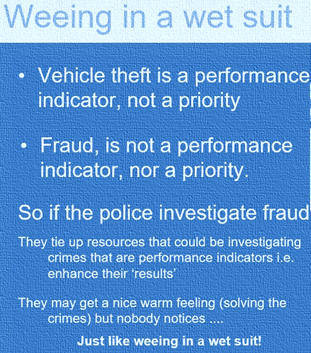
This concerns vehicles taken from people by fraud. Forged bankers’ drafts are less frequently seen, as is forged currency, but the odd ‘bounced’ or stolen cheque still arises.
The most prevalent fraud we see is that committed against motor dealers, where credit cards are used.
From the public perspective, the fraudulent taking of their vehicle is a particularly nasty crime; their insurance policy, which kicks in when a theft occurs, typically excludes loss of a vehicle taken by deception (fraud). They have no one to claim against (except the long-gone, man-of-straw, crook); from a legal perspective, their vehicle has not been ‘stolen’.
If the vehicle is found in the hands of an innocent purchaser this party MAY have acquired good title . But what follows is often a lengthy, complex argument about ‘title’. These can see police constabularies drawn into disputes if they have seized the vehicle and handed it back to the original owner, who might not in fact have the best claim to title. These disputes are unfortunate because they are between innocent victims; the intermediary fraudster has long disappeared.
Motor Traders who accept credit card payments may learn weeks or months later, that the purchase funds they received have been reclaimed by the providing bank when it is discovered the transaction was fraudulent.
This can also mean the subsequent innocent purchaser of the vehicle [from the trader], likely still on its original identity, is in for shock … using the car day in day out, travelling the same route, quite possibly passing ANPR cameras daily, they had previously encountered no issue. But the day the vehicle is recorded ‘LoS’ on the PNC and they drive past that ANPR camera …, an alert is triggered and the police descend – in one case, 7 officers were involved in the stop, seizure and detention of the driver.
The police often do not understand the legal issues, that the vehicle has not been ‘stolen’, that it was sold to a fraudster, who subsequently sold it to an innocent purchaser. The PNC is a blunt tool which does not make this distinction. I raised the issue years ago at a conference attended by constabularies, I have raised the matter separately with the MPS (Met’ police), but to my knowledge, there has been no change in the reporting process.
As for investigating fraud, below is an extract from another of our slide presentations:

And the innocent purchaser … Constabularies often direct victims to ActionFraud for an autogenerated crime number that likely sees no subsequent investigation – based on those I have encountered who have subsequently acquired a vehicle subject to a previous fraud.
